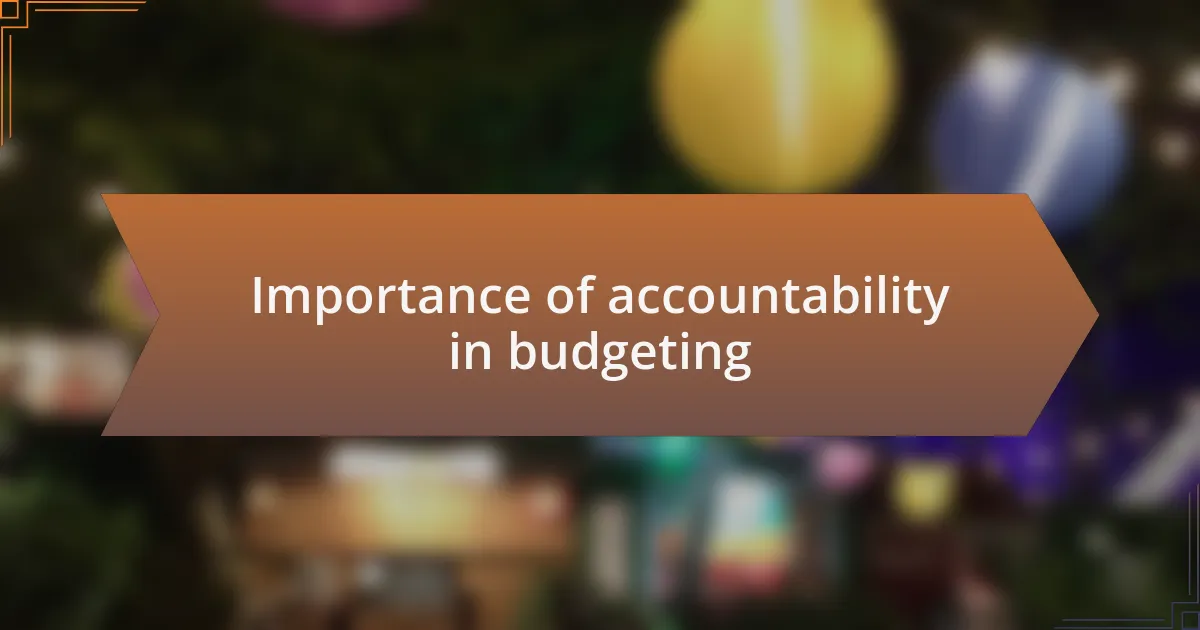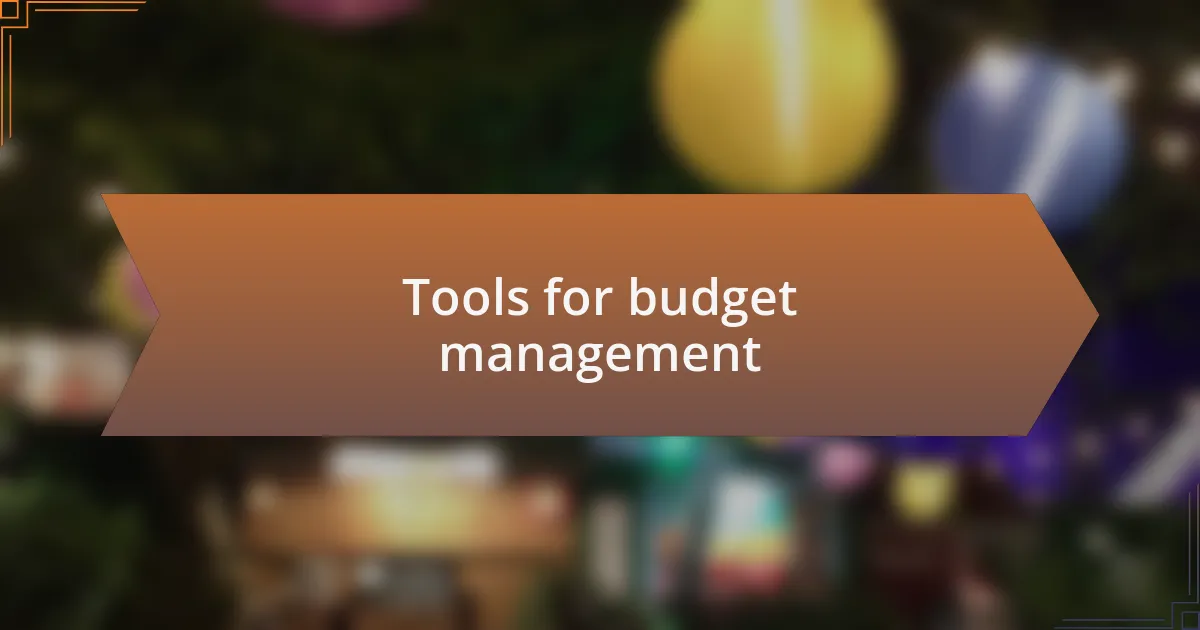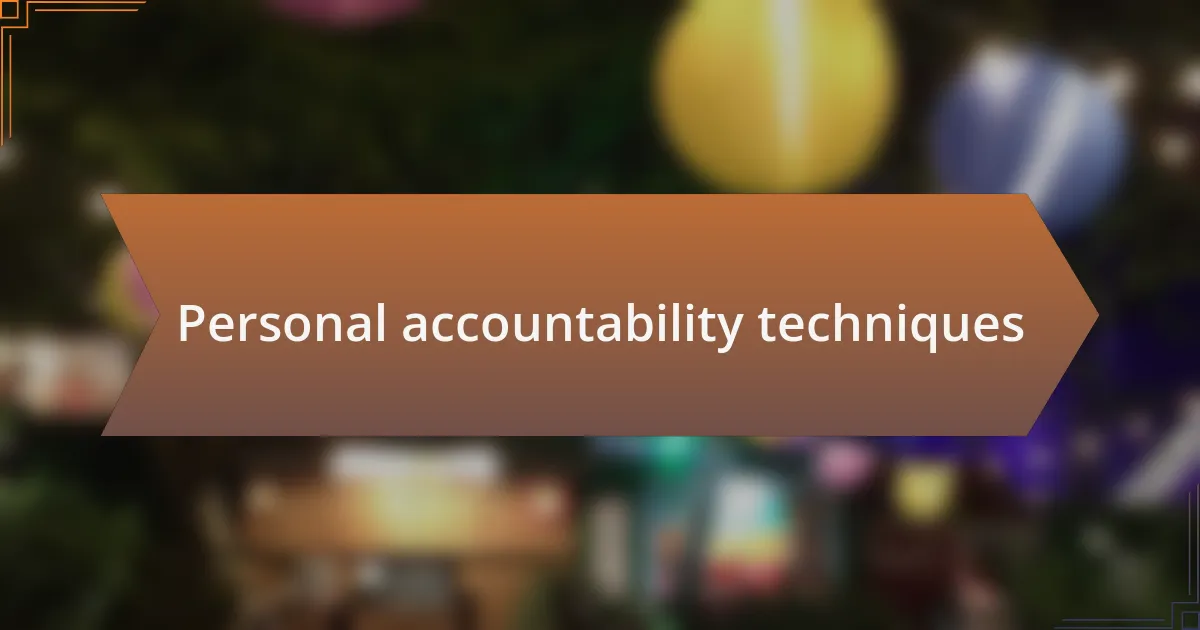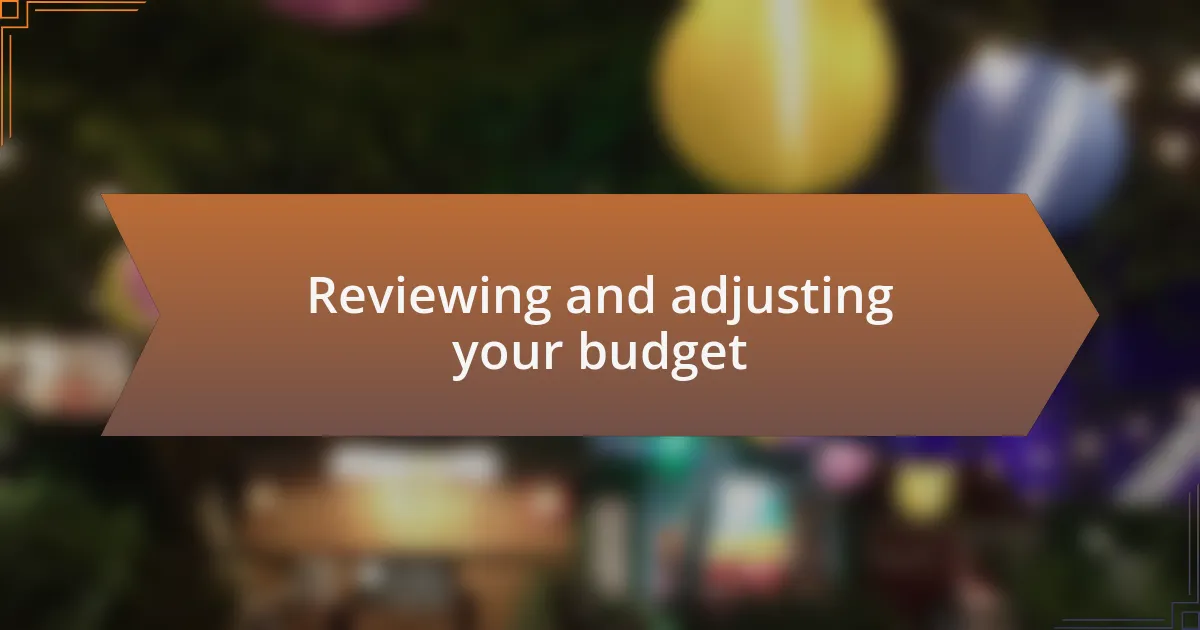Key takeaways:
- Setting a realistic budget from the beginning is crucial to avoid overspending and ensure all expenses align with event goals.
- Accountability fosters better decision-making and communication within teams, leading to resourceful budgeting practices.
- Employing effective tracking strategies and tools, such as spreadsheets and budgeting apps, helps manage expenses and maintain financial clarity.
- Regularly reviewing and adjusting the budget, including mid-event checks, allows for flexible responses to spending challenges and reinforces responsible financial management.

Understanding event management budgeting
When diving into the world of event management budgeting, I often think about the fine line between aspiration and reality. For instance, there was a time when I set my sights on a grand event with an intricate theme, only to realize halfway through planning that the costs were spiraling out of control. Have you ever had a similar experience? It’s that moment of clarity that truly emphasizes the importance of setting a realistic budget from the very beginning.
Understanding the nuances of budgeting means recognizing that every penny spent must align with the event’s goals. I recall a corporate event where I allocated funds heavily towards an elaborate venue, but neglected the essentials like marketing and guest engagement. That oversight taught me the hard way that a balanced budget is key to a successful event. How do you prioritize your spending?
Another important aspect is tracking expenses as they occur. I’ve learned to document every transaction, no matter how small, because little costs can add up quickly. This discipline not only keeps me accountable but also offers peace of mind. Have you found a method for tracking your event budget that works for you?

Importance of accountability in budgeting
Accountability in budgeting serves as a safeguard against overspending, particularly in event management where costs can easily escalate. I remember being accountable to a small team while planning a community festival. We established a clear budget and each member had ownership over specific line items. This collective accountability not only kept expenses in check but also motivated everyone to be more resourceful and innovative. Have you ever noticed how shared responsibility can make a budget feel less burdensome?
The emotional aspect of accountability cannot be understated. Knowing that my actions directly impact my team’s financial commitments instilled a sense of responsibility that pushed me to make better decisions. I recall a situation where I had to make difficult choices between high-end entertainment and more practical needs like catering. By prioritizing the latter based on our collective goals, I felt a deep sense of accomplishment. How do you handle tough budgetary choices, knowing they affect your team’s overall experience?
Furthermore, accountability fosters open communication. I learned that regular check-ins about our budget not only engaged my team but also created a culture of transparency. For instance, we often discussed our spending habits and shared insights about what was working or not. This dialogue made us all more aware and cautious with our finances. Have you found that discussing budget status with your team brings clarity and reduces anxiety?
![]()
Strategies for tracking expenses
Tracking expenses effectively is all about consistency and using the right tools. I’ve found that keeping a dedicated spreadsheet has been invaluable. Every time I make a purchase, I log it immediately—this simple act creates a level of mindfulness that helps prevent impulse buying. Have you ever noticed how just writing something down can make you think twice about a decision?
Another strategy that has worked well for me is categorizing expenses. By grouping costs into essential areas—like venue, catering, and entertainment—I can see where the bulk of my budget is going. For larger events, I often prepare a visual pie chart to share with my team. This not only sparks discussions but also highlights areas where we might need to tighten our belts. It’s fascinating how visual aids can change our perspective on spending, isn’t it?
Lastly, I regularly set aside time for budget reviews. I treat these meetings as a sacred appointment rather than a chore. During these sessions, I reflect on past decisions and make data-driven adjustments for the future. It’s almost therapeutic to see everything laid out clearly, allowing me to feel in control. How often do you assess your spending? For me, these moments of reflection not only enhance accountability but also reinforce lessons learned through experience.

Setting clear financial goals
Setting attainable financial goals is crucial for maintaining budget accountability. I remember when I first started planning events; I would simply estimate costs without really defining goals, and it often led to overspending. Now, I create specific targets, like allocating a set percentage of my budget for venue costs or catering. This clarity helps me stay focused and ensures that I’m not easily swayed by the allure of upgraded options.
I also find it incredibly helpful to break down my financial goals into short-term and long-term categories. For instance, while planning a large conference, I might set a long-term goal of keeping total expenses under a certain cap. Simultaneously, I establish short-term goals for individual components such as food and décor. Having these layered goals not only keeps me motivated but also provides a sense of accomplishment as I check them off my list. Have you ever tried this? It’s rewarding to see your progress laid out in a tangible way.
Moreover, I make it a point to revisit and revise my financial goals regularly. At the beginning of each event, I take a moment to align my goals with the current market conditions or any unexpected expenses from the previous event. This practice not only stabilizes my financial strategy but also strengthens my confidence in making tough decisions. It’s amazing how simply taking the time to articulate my objectives can transform how I approach budgeting—how do you make your financial goals feel more attainable?

Tools for budget management
When it comes to tools for managing my budget, I’ve found that using spreadsheets has been a game changer for me. I remember my first event; I jotted everything down on a notepad, but I quickly lost track of expenses. Now, with spreadsheet software, I can easily create formulas that automatically calculate totals, track spending against my budget, and even categorize expenses visually. Have you ever felt overwhelmed by numbers? A good spreadsheet can simplify that feeling and keep me grounded.
Budget management apps are another tool in my arsenal that I genuinely enjoy using. During the planning of a recent wedding event, I discovered an app that allowed me to set budget caps for different categories while sending me alerts if I approached those limits. This kind of real-time feedback provides an immediate sense of accountability, almost like having a financial buddy right in my pocket. I found myself asking, “Do I really need that extra floral arrangement?” This questioning led me to make wiser choices aligned with my budget goals.
Beyond digital tools, I’ve also embraced the old-school method of pen and paper for a more tactile approach. When I find myself getting lost in figures on a screen, I take a moment to jot things down on a notepad. It helps me visualize my spending and allows space for reflection. Recently, while planning a corporate retreat, I scribbled my budget thoughts while sipping coffee, which fostered clarity. Have you ever tried doodling your budget? It can really help you connect emotionally with your financial goals.

Personal accountability techniques
Tracking my expenses in a dedicated budgeting journal has proven to be a powerful secondary technique for personal accountability. After a couple of big-ticket events that went over budget, I started jotting down my daily expenses with a reflective note on how each purchase aligned with my goals. It’s amazing how writing things down prompts me to think twice, making me ask, “Is this item really worth it?” That simple act of reflection has made me feel more connected to my financial decisions.
Having a budget buddy is another technique I highly recommend. For my last event planning project, I partnered with a fellow planner who also wanted to stay accountable. We regularly checked in with each other, sharing our budgets and discussing our spending habits. This personal exchange transformed the sometimes tedious process of budgeting into an interactive dialogue. Have you ever noticed how sharing your goals with someone can create a sense of commitment? It’s like turning the budgeting process into a team sport.
Additionally, setting specific personal rewards has added a layer of motivation for me. For instance, when I successfully stick to my budget for a small event, I treat myself to a nice dinner or a day off to recharge. This approach not only keeps me disciplined but also creates positive reinforcement for good financial behavior. Ever think about how linking rewards to your budgeting can make the journey more enjoyable? It’s about celebrating those small victories that keep me engaged with my financial goals.

Reviewing and adjusting your budget
Reviewing and adjusting my budget has become a regular part of my event management routine. I set aside time each month to reflect on my spending and assess where adjustments are needed. For instance, after my first big event where the catering costs exceeded my expectations, I realized I had to revisit those budget lines. It struck me that staying flexible is just as crucial as planning ahead.
I find that a mid-event review can be particularly enlightening. During one of my recent projects, I took a moment to reassess my budget midway through the preparations. This proactive approach helped me identify areas where I could cut back without sacrificing quality. Have you tried this? It’s incredible how a simple review can reveal opportunities you hadn’t considered before.
As I make adjustments, I also remind myself to be kind to my budget. If I overspend in one category, I’m learning to balance it by cutting back elsewhere – a strategy that has improved my overall financial health. I’ve noticed that this mindset shift allows me not just to mitigate stress but to approach budgeting with a sense of empowerment. After all, managing a budget doesn’t have to be just about limitations; it can also be about finding creative solutions.